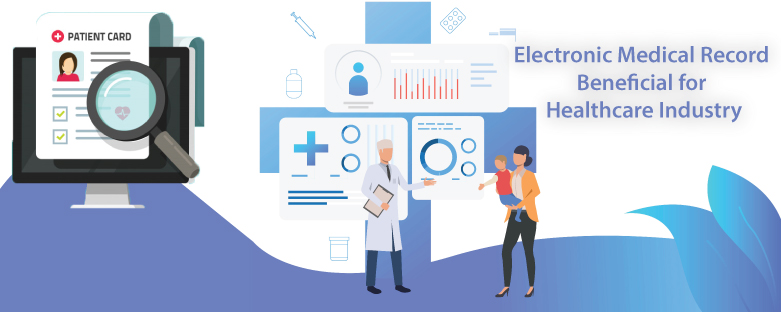EMR stands for Electronic Medical Record, which is the digital equivalent of paper records, or printed matter or documents at a medical organization. EMRs are a collection of records, information like the medical history of patients, ongoing treatment, upcoming appointments, etc. in an organized manner.
These records have the potential to provide substantial benefits to physicians, clinic practices, and healthcare organizations. Because of technological advancement in the Medical Industry, the scope of EMR & EHR, medical billing software, Remote Patient Monitoring systems, etc. is increasing day by day.
Let’s understand how is Electronic Medical record Beneficial for Healthcare Industry.
Table of Contents
ToggleLet’s Discuss Your Project
Get a free consultation and let us know your project idea to turn it into an excellent digital product
98+ Client Retention
Advantages of EMR Implementation
Let’s look at some of the benefits of implementing EMR in your practice:
- EMRs provide ease of access for healthcare providers, with a single electronic chart that can be accessed from any healthcare facility using EMR software.
- Implementing EMRs can offer financial benefits, including cost savings on office expenditures, improved billing services, and reduced operational costs.
- EMRs allow for better patient care and treatment, with healthcare providers having access to detailed information about a patient’s health history, medications, and allergies.
- EMRs can provide patients with links to educational materials, enabling them to make more informed decisions about their healthcare.
- The ability to quickly transfer patient data between departments is crucial in emergency situations, and patients can easily receive electronic copies of their medical records.
- EMRs can improve healthcare provider communication and lead to more coordinated care.
You May Also Like:
Implementing EMR Solution Into Your Practice: Tips and Strategies
The EMR implementation process can be daunting. It is essential to plan carefully to ensure that the transition is as smooth as possible.
Here are some tips and strategies to help you implement an EMR solution into your practice.
1. Conduct a Thorough Need Assessment
It’s critical to evaluate your practice’s requirements before installing an EMR solution. Assess your existing procedures, workflows, and technological infrastructure. Identify EMR features that will best match the particular needs and demands of your practice.
2. Develop a Comprehensive Implementation Plan
To ensure a successful EMR implementation, a thorough implementation plan must be created. The communication should also be clear. It should specify important deadlines, tasks, and milestones. It will ensure that all parties involved, including staff, patients, and vendors, are aware of the implementation process and any potential adjustments.
3. Involve Your Staff in the Implementation Process
Your staff can help you discover potential problems and areas for improvement while also offering insightful information about the day-to-day operations of your practice. Involving your staff in the implementation process also guarantees that everyone is on board with the process.
4. Provide Adequate Training and Support
For your staff to use the EMR technology efficiently, you must provide sufficient training and support. The training should take into account new workflows and procedures that come along with the solution in addition to its technological features. Continuous support is also essential for assisting personnel in overcoming any difficulties that may emerge.
5. Monitor and Evaluate the Implementation Process
Measure the progress over time and determine whether the EMR solution is satisfying your practice’s objectives and requirements. Additionally, it’s critical to get staff and patient input so that the implementation strategy can be modified as necessary. A smooth transition to an EMR solution can be ensured with regular monitoring and optimization of the implementation process.
You May Also Like:
Techstack for Implementing EMR Solutions
Any EMR solution, irrespective of the scale, must store, retrieve, and process a large amount of patient-provider data. Hence, the tech stack is complex and resource-consuming.
A typical Electronic Medical Records tech stack includes:
- Hardware components such as servers, computers, mobile devices, and
- Software applications like databases, operating systems, and EMR-specific applications.
Cloud-based solutions are becoming increasingly popular for EMR implementation as they offer scalability, accessibility, and cost-effectiveness. Security is also a crucial aspect of the EMR tech stack, with encryption, firewalls, and access control measures being essential to protect patient data.
Healthcare organizations must carefully evaluate their tech stack requirements to ensure that they choose a solution that can effectively manage their data, follow HIPAA guidelines and provide high-quality patient care.
Understanding EMR vs EHR
EMR and EHR are frequently used in the same breath. But it’s crucial to recognize their primary distinctions. Healthcare businesses can select the best digital technology for their purposes by being aware of the differences between EMR and EHR.
EMR, or Electronic Medical Records, focuses primarily on patient health information generated within a single healthcare organization, such as a hospital or clinic.
EHR, or electronic health records, on the other hand, offer a more thorough perspective of a patient’s medical history by combining data from many sources. These resources can be multiple providers, healthcare facilities, and more.
Does your practice need an EMR or EHR? Talk to an expert now.
Click now to get started!
98+ Client Retention
Final Words
MR has grown in popularity among medical facilities and healthcare professionals. But it is crucial to take into account any potential challenges:
A major concern is the financial cost of installation. If not planned well, can result in operational expenses. However, with careful strategy and cost-benefit analysis, these challenges can be overcome.
Another issue that can arise during EMR adoption is temporary losses in productivity due to the adjustment of workflows and training of end-users.
It is important to note that these drawbacks are temporary and do not outweigh the long-term benefits of EMR, which include improved patient care and increased efficiency.
As the demand for EMR continues to grow, it is essential to partner with a reliable and experienced healthcare IT solutions provider in India like Dreamsoft4u Pvt. Ltd. An expert technical partner will help ensure a successful implementation.
Contact us to learn more about our range of healthcare software development services, including EHR, EMR, and remote health monitoring systems.
FAQs
How do Electronic Medical Records improve patient safety?
EMRs can reduce the risk of medication errors and improve accuracy in diagnosing and treating patients.
How do Electronic Medical Records increase efficiency in healthcare?
EMRs can streamline administrative tasks, such as scheduling appointments and billing, and allow healthcare providers to quickly access patient information.
How do Electronic Medical Records enhance communication among healthcare providers?
Using EMRs healthcare professionals can share patient data easily and securely using a simple mobile app. It helps providers coordinate and communicate effectively and leave little room for guesswork.
What is the use of Electronic Medical Records in nursing practice?
Nursing staff can quickly and accurately record patient information using an EMR. This information is easily accessible to other providers. Zero mistakes and better communication improve patient outcomes.











